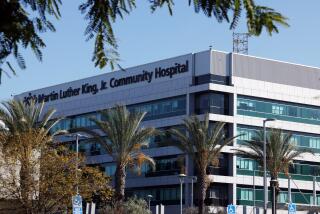Hospital Rejected Funds for Dialysis
County-USC Medical Center officials in May 2000 turned down thousands of dollars to supplement its chronically understaffed emergency dialysis unit by training more specialized nurses.
Less than three months after administrators rejected the money, a critically ill woman died after waiting four hours for specially trained nurses to arrive and perform dialysis. Hers was the first of three deaths over the next six months among patients who endured long waits for the procedure in off-hour emergencies, according to doctors and medical records.
On Friday, a spokesman for the county Health Department, which operates the hospital, acknowledged that hospital administrators had passed up an opportunity to resolve the crisis before it turned deadly.
The proposal came from nurses on a labor-management committee concerned about the county’s ability to hire and retain nurses during a nationwide shortage. That panel recommended putting $240,000 of county money into a program that would train county nurses to perform dialysis.
The decision to reject the proposal, county Health Department spokesman John Wallace said, “was certainly inconsistent with trying to fix the problem.”
It was the second time the hospital turned down a proposed solution to the dialysis delays. In the late 1990s, the administration rejected as unworkable a proposal from medical staff to have private dialysis nurses fill in during off-hour emergencies.
Union officials disclosed their proposal after a Times report last week on the deaths and other failed attempts to fix the dialysis delays at County-USC.
Doctors and nurses there for years had complained about difficulties getting emergency dialysis for critically ill patients during the night and on Sundays.
Administrators said the problem was that the hospital did not have enough nurses for round-the-clock staffing and had to rely on calls to private nursing services. The nurses did not always come in.
In January, the hospital apparently resolved the dialysis problem by requiring staff nurses to respond to emergencies around the clock. But three patients died in the meantime, beginning last August.
The proposal made the year before by the labor-management committee “was a golden opportunity,” said Bart Diener, assistant general manager of Service Employees International Union Local 660, which represents county health workers, who sat on the committee that made the recommendation.
In fact, the proposal was similar--though smaller in scale--to action taken Tuesday by the county Board of Supervisors in response to the Times reports. The board then agreed to devote $2.5 million to training nurses in specialized tasks such as dialysis.
Under the proposal last year, $60,000 was to go to training dialysis nurses, and $180,000 would be used to find new nurses to fill in for those being cross-trained, according to notes from the meetings.
“Front-line nurses saw this problem long before it got into the headlines,” Diener said.
Administrators at five of the county’s hospitals rejected the proposal on May 8. Those hospitals did not have dialysis equipment on site and preferred to rely on private nurses who brought equipment.
County-USC had its own equipment and staff of dialysis nurses, but administrators there, who have contended in interviews that they were desperately trying to ensure reliable dialysis, rejected the proposal on May 30.
Wallace said that, despite the promise of $180,000 to help fill in for nurses learning dialysis, administrators feared they would not be able to find enough regular staff to keep a sufficient number of hospital beds open during the retraining.
More to Read
Sign up for Essential California
The most important California stories and recommendations in your inbox every morning.
You may occasionally receive promotional content from the Los Angeles Times.









